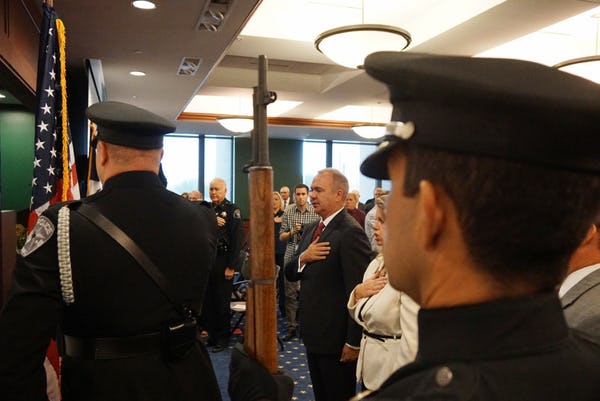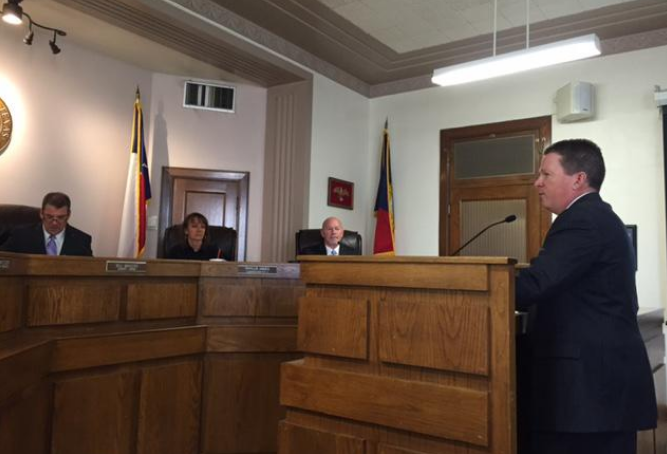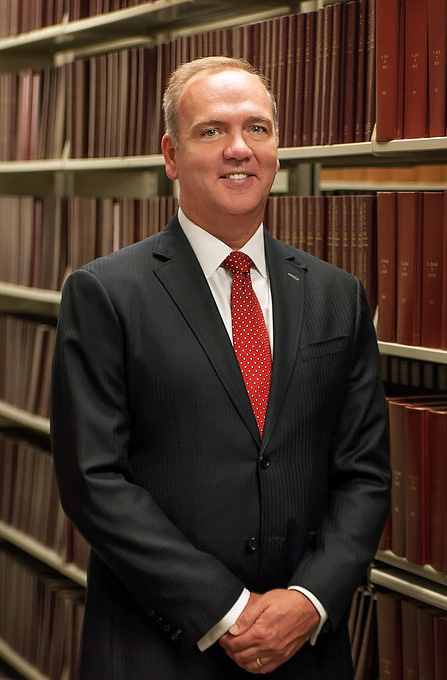Grayson joins other counties for Texas’ first regional Veterans Court
Posted by thejudge in Jun, 2017
In 2011, on his second deployment to Afghanistan, his unit was ambushed. One of his fellow soldiers died, while 15 others were wounded.
Since then, getting re-established back home has been difficult for Floyd, a 12-year staff sergeant.
“My integration process has been a nightmare, to say the least,” said Floyd, who shared his story Friday at the Rockwall County Courthouse during the dedication of Texas’ first regional Veterans Court.
He had already picked up a couple of DUIs since returning home to Durant, Oklahoma, and was on probation last year when he was pulled over on suspicion of a third. But this time, he was on the Texas side of the Red River, in Grayson County.
That happened to be one of five counties where Judge John Roach was presiding over a state-authorized Veterans Court.
Veterans Courts connect vets who have landed in the legal system and who are struggling with mental health and substance abuse issues with counseling and other treatment programs. If rehab is successful, the charge is wiped off the vet’s record.
Roach, after handling his Collin County district court caseload Mondays through Thursdays, presides over Veterans Courts on Fridays. He started in Collin and Rockwall counties in 2014 and has since expanded to Kaufman, Fannin and Grayson counties.
A ceremony Friday marked Texas’ first regionwide initiative. The five counties celebrated an official partnership, North Texas Veterans Court, to continue as one under Roach.
“We couldn’t let a veteran, because of a geographic line, not have a Veterans Court,” the judge said.
Texas has 173,000 people on active duty and 1.6 million veterans living in its 254 counties — but only 26 Veterans Court programs.
“In a medium-sized jurisdiction, we just don’t have the numbers to support an entire Veterans Court by ourselves,” said Kenda Culpepper, Rockwall County’s district attorney. She said informal meetings with the judge to help create the North Texas Veterans Court started about two years ago.
 Ignoring the signs
Ignoring the signs
North Texas Veterans Court inherits the five counties’ 48 cases and has a capacity of about 65. Each veteran is screened by committee before being admitted to the program. Most have post-traumatic stress disorder, traumatic brain injury, substance abuse or anger management issues.
“They’re too proud to ask for help,” Roach said of the clientele. “Instead, they self-medicate and ignore the signs, being the tough person they are trained to be.”
A Desert Storm veteran, Roach works as a volunteer. A $100,000 grant administered through the Texas Veterans Commission provides a full-time assistant and other services for the program. The state has also put aside $1.5 million for Veterans Courts.
Veterans organizations, elected officials, law enforcement, criminal attorneys and county, state and federal governments all played a role in the five-county collaboration.
Veterans Court is not an option for most violent offenders, though some domestic abuse cases are in the system — mostly involving family and all with the consent of the victim.
Thomas Palladino, executive director of the Texas Veterans Commission, said the programs include mental and physical services through the Veterans Administration, but also help in filing disability claims or employment services.
Local drug and alcohol rehabilitation programs and individual mentoring are also available.
“The end result is that they’re stable, that they’ve improved their physical and mental well-being so they can be productive members of society,” Palladino said.
Texas Sen. Bob Hall said it’s a tough program, but those who have shown the dedication to serve have the necessary tools. He said veterans are just “temporarily buried” beneath post-wartime issues and that society, through the court, has an obligation to repay them by changing the trajectory of their lives.
“The military teaches combat skills and plans for war,” said Don Hoover, a veteran and Fannin County prosecutor. “It often loses sight in teaching us to cope after we come back.”
Hall encouraged service members to tell their stories of transformation as a means of inspiring others to seek help. Colt Floyd plans to do just that.
“Every day is a struggle,” Floyd said, recalling a 96-day stretch where he saw 14 fellow servicemen killed. “But the 17 months in the Grayson County program has completely changed my life. I can’t explain in words how appreciative I am.”

Category: In The News, News, North Texas Veterans Court




